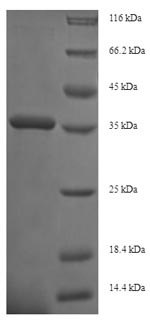Recombinant Human Integrin alpha-2 (ITGA2) is produced in E.coli, featuring a partial protein length from amino acids 188 to 365. This product carries an N-terminal 6xHis-SUMO tag for straightforward purification and detection. It achieves a purity level exceeding 90%, as confirmed through SDS-PAGE analysis. Designed strictly for research use, this recombinant protein maintains low endotoxin levels, which appear to make it appropriate for various laboratory applications.
Integrin alpha-2 represents a crucial component of the integrin receptor family. It's primarily involved in cell adhesion and signal transduction processes. The protein plays what seems to be a significant role in mediating interactions between cells and the extracellular matrix. Central to numerous cellular processes, Integrin alpha-2 is frequently studied for its involvement in pathways related to cell migration, proliferation, and tissue remodeling. This makes it particularly valuable for biomedical research insights.
Potential Applications
Note: The applications listed below are based on what we know about this protein's biological functions, published research, and experience from experts in the field. However, we haven't fully tested all of these applications ourselves yet. We'd recommend running some preliminary tests first to make sure they work for your specific research goals.
Human ITGA2 is a complex transmembrane receptor that requires precise folding, proper disulfide bond formation (with multiple conserved disulfide bonds), glycosylation at specific asparagine residues, and heterodimerization with beta subunits for its functional activity in collagen binding and cell adhesion. The E. coli expression system cannot provide the eukaryotic folding environment, oxidative conditions for correct disulfide bond formation, or glycosylation machinery required for this integrin subunit. The partial fragment (188-365aa) lacks critical domains, including the beta-propeller domain and transmembrane region essential for full functionality. The large N-terminal 6xHis-SUMO tag (∼15 kDa) may sterically interfere with the protein's structural domains. The probability of correct folding with functional collagen-binding activity is extremely low.
1. Antibody Development and Validation Studies
This application is limited to linear epitope recognition with significant limitations. While antibodies can be generated against linear epitopes within the 188-365aa region, they may not recognize conformational epitopes of the full-length, glycosylated integrin. Antibodies raised against this non-glycosylated, prokaryotically expressed fragment will likely not efficiently bind to the authentic integrin in its native membrane context.
2. Structural and Biophysical Characterization
Basic biophysical analysis can be performed, but will not reflect native integrin structure. The lack of glycosylation and probable incorrect disulfide bonding mean results will describe an artificial protein fragment rather than the authentic integrin. The SUMO tag will dominate structural properties and interfere with meaningful structural biology.
3. Biochemical Assay Development and Optimization
This application has severe limitations. The protein can serve as a standard for detecting the 188-365aa region in non-functional assays, but cannot be used for functional integrin assays. Collagen-binding or cell adhesion assays using this fragment will yield biologically meaningless results due to improper folding and lack of functional domains.
Final Recommendation & Action Plan
This E. coli-expressed ITGA2 fragment is fundamentally unsuitable for functional integrin research due to the essential requirements for glycosylation, proper disulfide bonding, and heterodimerization that cannot be met in this expression system. The protein cannot be used for interaction studies and has severe limitations for Applications 1, 2, and 3. For authentic integrin research, use a full-length protein expressed in mammalian systems that supports proper glycosylation, disulfide bond formation, and heterodimerization with beta subunits to preserve native conformational epitopes and collagen-binding capability.






